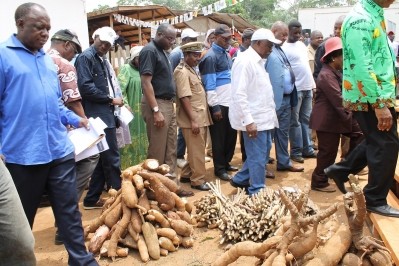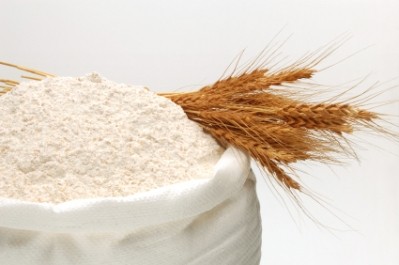Milling & Grains Bite-Size News
Cargill-ConAgra merger, US corn exports dive, Ukranian grain imports up, Nigeria cassava flour

Major agribusiness merger in final stages
The planned merger between Cargill and ConAgra Foods’ flour mill operations should be ratified within six to eight weeks following a lengthy investigation by the US Justice Department’s antitrust division.
The deal was originally announced last March and will merge ConAgra’s milling operations with those of Horizon Milling (jointly run by Cargill and US farm cooperative CHS). The joint venture will give the new company, Ardent Mills, a controlling third of US flour mill capacity. Completion was expected by the end of 2013 however arrangements were stalled pending the results of the investigation.
But Cargill executive chairman Greg Page is now confident the deal will get the go-ahead in a matter of weeks. He said: "We hope everything will be resolved in the next six to eight weeks. It took longer than we would have hoped, and I'm sure that our employees would have hoped, but there's been continuous attention given to it by the Justice Department. I think we're in the very final chapter of having it resolved positively."
Cargill and ConAgra Foods will hold an equal 44% majority share each of Ardent Mills, leaving CHS with a 12% share. Horizon Milling’s president Dan Dye will run the merged company as CEO and Bill Stoufer, president of ConAgra Foods, will join him as COO and chief integration officer, with headquarters in Denver.
China rejections severely hit US corn exports
A report from the National Grain and Feed Association (NGFA) says US corn exports to China were down 85% in January compared to the same period last year, representing an approximate $225m trade loss.
Major US exporter Cargill, last week said rejections of US corn shipments by China contributed to a 28% drop in earnings for the quarter ended February 28.
The huge shortfall is a reflection of China’s continued mistrust of US corn after finding traces of unapproved GM corn in shipments last November. Since then, China has rejected almost 1.45 million tonnes of corn shipments.
China has steadily increased corn imports over the last five years, from 47,000 tonnes in 2008 to around five million tonnes last year and it was the third largest importer of US corn before the discovery of Syngenta’s unapproved GMO strain last year. The NGFA and North America Export Grain Association have unsuccessfully lobbied Syngenta to halt sales of corn seed containing MIR 162 and another unapproved variety called Agrisure Duracade to try to limit further damage to the industry.
US traders are now calling for seed companies to shoulder some of the financial losses and have urged them not to release new seed varieties in the future until they have been approved by major markets, like China, which has so far approved 15 genetically modified corn strains for import.
EU launching duty-free imports for Ukrainian grain
The European Union is set to launch a duty-free import deal on grains from the Ukraine as part of a package of trade benefits giving the country easier access to the EU’s half a billion consumers.
The bilateral free-trade agreement applies to manufactured products and other exports and will come into force later this year. However the EU is to set quotas on the volumes of duty-free imports of certain farm products, including grains, to protect the interests of EU farmers.
Once the unilateral trade measures are approved later this month, the duty-free quotes will open until October 31 for the import of 950,000 tonnes of Ukrainian wheat and flour, 400,000 tonnes of maize and 250,000 tonnes of barley.
Under the full free-trade deal, the quota volumes would rise within five years to one million tonnes for wheat, 650,000 tonnes for maize and 350,000 tonnes for barley, an EU official said.
The exclusive quotas will be in addition to the EU's existing tariff-rate quotas for shipments from all countries of wheat, maize and barley. The maize quota is currently duty-free, while wheat and barley imports under the quotas pay tariffs, after being duty-free in the two previous seasons.
The European Union is the top destination for Ukrainian maize, with southern Europe and the Netherlands among its biggest clients. It provides more than half of the EU's total maize imports.
Cassava flour production on target
Nigeria will soon be self-sufficient in wheat flour thanks to its campaign to increase production of cassava flour, says the country’s minister of Agriculture and Rural Development, Dr Akinwumi Adesina.
President Goodluck Jonathan launched the Agricultural Transformation Agenda (ATA) in 2011 with the aim of adding 20 million metric tonnes of food to the national food output by 2015. Integral to his plan was a campaign to increase the inclusion of cassava flour in wheat flour by 20%.
At the time, the government felt the country was too dependent on imports, including wheat, which it said was “hurting Nigerian farmers, displacing local production and creating rising unemployment” and it did not feel the situation was sustainable fiscally, economically or politically.
The government outlined various incentives and packages to increase productivity and quality. Part of the government plan was to impose a levy of 15 % on wheat grain imports and increase the effective duty from five to 20 %. The gain from the levy was used to establish the Cassava Bread Development Fund.
Dr Adesina said the government is “making frantic efforts to place Nigeria as the number one cassava processing country in the world”. He added: "President Goodluck Jonathan is excited with what farmers are doing because without food there cannot be national security. President Jonathan launched the ATA just three years ago and his goal was very simple - to take Nigeria from a food dependent to a food self-sufficient country and also making it a food exporting country.”
By 2013 the net income from rural farming had increased to 174 billion naira, with cassava production contributing three billion and maize 105 billion naira.









